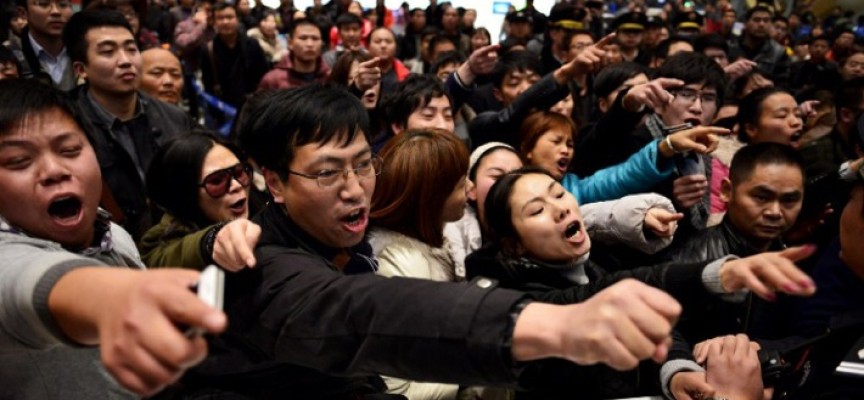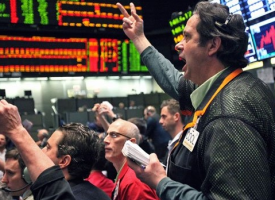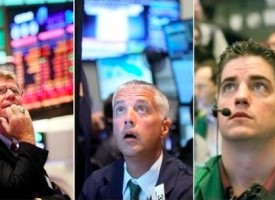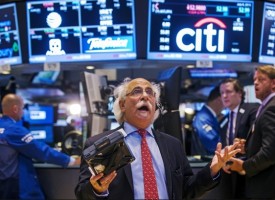As we kickoff trading in what promises to be a wild October, China is worried the world is at risk of seeing an economic Apocalypse and they fully intend to stop it from happening.
Stephen Leeb: “Several weeks ago in my KWN interview, I noted that the well respected publication Asian Review had just reported that China was getting ready to launch an Eastern oil benchmark denominated in yuan and backed by gold. This was confirmation of something I had predicted in a KWN interview more than a year ago, seeing such a benchmark as inevitable given China’s long-range determination to ensure control over its own fate…
A True Game-Changer
Establishment of the benchmark will be a true game-changer. It will kickoff a process that will reshape the monetary system in ways that will diminish the dollar’s importance, and elevate the role of both the yuan and gold – helping propel gold to new heights along the way.
I realize, however, that many in the West still assume that the dollar is still too mighty, and the U.S. still too important, for China to significantly attack the dollar, Eastern oil benchmark or not. Unfortunately, anyone holding on to that belief is either ill-informed or in denial. Yes, it’s always hard to imagine or accept that a long-established status quo can be upended. But those who bury their heads in the sand will end up financially harmed. Those who recognize the new reality that lies ahead – and respond to it by buying gold – will end up with fortunes.
We see clear potential pathways China can follow to move from establishing its oil benchmark to implementing a new monetary system centered on gold and the yuan. As the launch of the benchmark draws nearer, it’s worth looking at what those pathways are. Delineating them may help convince doubters that China has the capability to achieve its ultimate goal of a monetary system underpinned by the yuan and gold.
I’ll start with one very relevant fact that helps lay the groundwork: China already exchanges yuan for gold – in the trading of futures contracts on the Shanghai Gold Exchange. Gold futures trading on the SGE is conducted in yuan, but nearly 100 percent of the trades are settled with the exchange of physical gold. By contrast, in the U.S. only 2 percent or less of gold futures trades are settled with gold exchanging hands for dollars; the remaining 98 percent of short and long positions are simply rolled over. So bringing in gold to back yuan in oil futures trading isn’t a brand-new experiment. It can be seen, rather, as an extension of what already exists – and as something China will be able to broaden further later on, extending it to other commodities and items traded.
Keep in mind that the most important reason the dollar remained the world’s reserve currency even after the U.S. went off the gold standard in 1971 is that dollars were needed to buy oil, the result of an agreement Nixon made with the Saudis. The two major oil benchmarks today are Brent in Europe and WTI in the United States. Both are denominated in dollars, meaning you need dollars to trade these contracts. Dollars also are used anytime anyone takes physical possession of oil, including as the result of a negotiated agreement outside the futures exchanges. Because oil remains the world’s most important commodity, this so-called Petrodollar system has kept the dollar securely enshrined as the world’s primary reserve currency.
 Bretton Woods System Risks Economic Apocalypse
Bretton Woods System Risks Economic Apocalypse
China, however, sees no rationale – and a lot of risk – for the dollar continuing to occupy this role. For China, a major lesson from 2008’s financial meltdown was that the dollar’s continued role as a reserve currency risks economic apocalypse. And if the dollar’s unique ties to oil kept the dollar supreme for the past many decades, China’s foray into oil traded in yuan underpinned by gold will be what starts the process of upgrading the current monetary system.
Once China launches an Eastern oil benchmark traded in yuan and backed by gold, China will use yuan to buy oil from the Saudis, who could, if they choose, exchange the yuan for gold. As we noted above, the facilities for making such gold-for-yuan exchanges are already in place on the Shanghai Gold Exchange. But that would be only the first step. The next would be the broadening of the yuan’s use from oil to almost all commodities traded on Chinese exchanges. Moreover, the Chinese will likely choose to negotiate as many bilateral and multilateral trade agreements as possible in terms of yuan. If a country did not have yuan, it could sell goods to the Chinese or to other yuan holders to obtain yuan, or it could use gold to buy yuan on the SGE, or it could borrow gold. Regardless, a portion of a country’s trade balance would be defined in terms of gold, with gold owed to whichever country lent the yuan. The bottom line is that, in the East and possibly beyond, gold would begin to take its place as the center of a new monetary system.
Holders of yuan would be able to exchange yuan for a fixed amount of gold – some small fraction of an ounce – but the price of gold would fluctuate based on market forces rather than being fixed as it was after Bretton Woods. So if gold rose sharply, the amount of gold exchanged for one yuan would fall.

World Moving Away From Dollar
This system would likely eventually govern most trade throughout the East, and especially trade among countries that are part of the One Belt, One Road initiative, where China is the clear hegemon. These countries account for 62 percent of the world’s population and hold over 75 percent of hydrocarbon resources, whose trading will come to be denominated in yuan. And in terms of international dollars, these countries represent more than half of the world’s GDP. In other words, a monetary system that holds sway in the East will cover the preponderance of global trade.
What would be going on in the West as all these changes are happening? One possibility is that Western currencies would be fixed relative to the yuan, with the level periodically reviewed. Alternatively, the dollar could trade against the yuan. This could be dangerous, though, if, as is widely believed, the West doesn’t have abundant stores of gold. It would likely lead to the dollar and other Western currencies depreciating enormously in that any holder of yuan would demand a huge premium to exchange a gold-backed currency for a currency not backed by gold.
Still, it might be easier to get the West to go along with this than might seem likely at first blush. That’s because a much lower dollar would mean much greater Western exports and possibly much stronger growth in the United States. And this would be fine with China: all else equal, China would love to create a win-win situation.
Overall, though, while the steps China will take to fully structure the new monetary system have to remain speculative for now, my best guess is that they are thinking in terms of a basket of currencies – possibly the SDRs which currently consists of dollars, euros, the British pound, yuan, and the yen – to which gold would be added as a component. The weightings of the various currencies could be proportional to the amount of gold held. Or if there are great disparities in gold holdings, the weightings could be equal or even the same as they are today. It won’t really matter. Whether the currencies are fixed relative to one another or trade in the open market, gold, whose supply is limited, would appreciate sharply relative to the currencies. In other words, regardless of initial weightings, gold would sharply appreciate against all paper currencies in the basket as any country wanting to buy SDRs would have to have gold to effect the purchase or pay a huge premium if it did not have gold.
Cryptocurrencies
All this will get complicated especially when it comes to complex transactions. That’s where I think cryptocurrencies and especially blockchains will play a critical role. A blockchain, which is a distributed database, would allow a permanent record of all nation-to-nation trading. And China, as we’ve noted before, is the world’s leader in blockchains thanks to the lead it has established in supercomputers, which are needed to handle the exceedingly complex computations blockchains entail.
I find it very interesting that China recently outlawed the trading of all cryptocurrencies, including Bitcoin, while dramatically stepping up its research on blockchains. Thanks to its access to cheap energy through its enormous hydropower resources, China clearly is the country best positioned in terms of its computer capabilities to keep track of, and add to, the blockchain that would serve as the database for international trade. Curiously, the Chinese government has not outlawed the “mining” or creation of new Bitcoin. It is telling, I think, that even though the Chinese cannot trade Bitcoin, they continue to mine roughly 80 percent of new ones created. To transition from a Bitcoin blockchain to a blockchain for a new gold-based currency would be a relatively natural step and one only the Chinese have the capacity to effect.
A relevant question is whether China has enough gold on hand to carry out all its plans that depend on the metal. I can’t give an exact figure for how much gold China would need, but all indications are that it already has more than enough. The SGE is already, by a very large margin, the world’s largest market for trading physical gold, and there has never been an issue of there being enough gold to assure an orderly market. It is almost inconceivable to believe that the Chinese would initiate a much broader use of this exchange unless they were sure they could maintain an orderly market. And there are strong indications that China’s gold holdings exceed those of all other countries combined.
And, of course, China maintains its longstanding, fervent belief in gold. This quote from the Chinese Communist Party’s secretary in charge of gold before bears repeating:
“For China, gold’s strategic mission is to support the internationalization of the yuan and be strong support for China’s goals of becoming an economic power and realizing the “Chinese Dream.”
Gold’s Gains Will Be Historic
I expect that initiation of the new Eastern oil benchmark will be greeted by a surge in gold, perhaps to new highs, along with much higher oil prices. But that will be just the start. As the process of reshaping the world’s monetary system proceeds, gold’s potential gains will be historic, and it’s a slice of history that no investor should miss out on.”
Speaking of gold…
In The Footsteps Of Giants
One of the top questions KWN receives from investors about the mining industry is always: “How do you know out of the thousands of companies there are to choose from which will take-off and which ones will falter?” The answer for smart money investors is always to look for proven leaders with previous success as a good indicator of future success. One individual that fits this description is pictured below with multi-billionaire Robert Friedland.

Multi-billionaire Robert Friedland chose this man to lead his expoloration team and it turned out to be a brilliant move because he was responsible for two of the largest and most important discoveries the world has ever seen while leading the team at Ivanhoe Mines. Investors across the globe are now following this man into his latest venture where he will help lead an exploration team where the CEO believes the team will deliver drill results that will send the stock price soaring more than 1,000 percent! Also, a legend in the business just made a 7-figure investment into this relatively unknown company. To get in on the ground floor and learn more about this remarkable company simply CLICK HERE.
***To listen to Rick Rule and I discuss one of our top stock picks, the action in the gold and silver markets and much more CLICK HERE OR ON THE IMAGE BELOW.
***KWN has also released the remarkable audio interview with Bill Fleckenstein discussing the catalyst for gold breaking above $1,400, what to expect from silver, stock markets, interest rates, housing and much more and you can listen to it by CLICKING HERE OR ON THE IMAGE BELOW.
***ALSO JUST RELEASED: Jeremy Grantham – This Is What The Investing World Has Become CLICK HERE.
© 2017 by King World News®. All Rights Reserved. This material may not be published, broadcast, rewritten, or redistributed. However, linking directly to the articles is permitted and encouraged.









